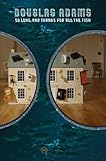About the book...
What happens when an ordinary person becomes extraordinary?
Tobias starts out in life much the same as any of us—not rich, not poor, with imperfect parents and unlimited ambition. When he’s twenty years old, his future is altered in irreparable ways after a tragic car accident pushes him down a new path. The once-promising anthropology major is forced to abandon his dreams in order to care for his orphaned, brain-damaged younger brother.
In his late thirties, Tobias works in a bookstore, trying desperately to make ends meet to support his family. His daily grind only reinforces the sadness that broken dreams and bad luck bring in their wake.
How many times have you heard someone say, “If only I won the lottery?”
When Tobias finds he has won the Mega Millions lottery, his unimaginable bad luck seems to have changed into unimaginable good luck … or has it?
Over peaks and valleys, this uplifting journey will challenge the limits of luck, life, and what we value most.Find out more about the complications of Tobias’s friendship and rivalry with his best friend, Martin; the effects of all this bad luck and good luck on his marriage; and the struggles of his brother, Simeon, once a talented cartoonist, in
… You Never Know.
In Lillian's words...
My husband and I are both survivors of the 2001 terrorist attacks on the World Trade Center in New York. As an author, an experience like that makes me want to write books with a positive message, and that’s what I aimed for in my novel You Never Know.
On September 11, 2001, I was heading to New York City to my job as a computer consultant for Lehman Brothers in One World Trade Center. My commuter train was in the middle of the New Jersey Meadowlands when the first plane hit, and a conductor came walking through the cars telling everybody.
I got out my Walkman radio and put on headphones to listen, and soon a crowd gathered around me. “A jet plane hit World Trade Center No. 1,” I told them. The radio announcer said it was a 747, and I told them that, too. “And the Kennedy Center,” the radio man said nervously. I repeated it. “No, it was the Pentagon!” the radio man said.
I repeated that to the people huddled around me, and one man said, “We’re at war.” Two of the commuters started crying. Through the windows, we could see smoke coming from downtown Manhattan.
When we arrived at Hoboken Terminal, just across the Hudson River from the attack, the police and FBI were all over the terminal, sending everybody home—no PATH trains, no ferry, no crossing over to New York City.
I got onto a very crowded train heading back to my home town in New Jersey, and one of my colleagues ended up standing next to me in the vestibule. All the way home, I was frantically trying to call my husband in his office at a brokerage firm in the first tower. No answer.
Two weeks later, my colleague reminded me that we had seen the towers crumble from the vestibule of our very slow train. I simply had no memory of that. “No,” I told him, “We didn’t see that. You’re joking.”
“No, I wouldn’t joke about that,” he told me. “Your memory was lost because it was too traumatic.”
I rode my bike home from the train station and sat in front of the TV alone, crying, worrying about my husband, George. At 2:00 in the afternoon, after dozens of phone calls from family and friends, George’s friend called to say that he was safe and he had escaped, but couldn’t call home because of all the cellphone difficulties. Only an hour later did I hear from a relative whom George had been able to reach.
It was 8:00 p.m. before George came home, traumatized and pale, but safe. Two days later, during one of many phone calls to family members, I learned how close he’d come: George had been invited to a presentation in Windows on the World that day, a breakfast meeting, on the 107th floor. His schedule had been so overloaded that he’d forgotten to attend. He didn’t want to tell me that at first, because the catastrophe was so overwhelming.
We didn’t sleep that night, but held hands the whole night. We hardly slept for several nights afterward. Our grown son, who lived in NY City at the time, came home to NJ as soon as traffic was permitted. He and his wife stayed with us for a week or so because they didn’t want us to be alone.
We both returned to work soon after the attack—my husband George as an officer in a brokerage firm, and me as a computer programmer for Lehman Brothers (R.I.P.) But it was never the same. George eventually retired early because of post-traumatic stress disorder. He had watched, shocked, as all the firemen trudged up the stairs to their deaths, while he and his colleagues climbed down the stairs to safety. As for me, a few months afterward, I switched careers, from high-pressured programming to technical writing.
We’re both all right now, thankful that our lives were spared, and deeply mournful for those who lost theirs, and for their loved ones who remain.
Many thanks for your invitation to post this entry on Mad Moose Mama.
Sincerely,
Lilian Duval
Lilian Duval lives with her husband George, a native of Singapore, in a small house in New Jersey overlooking a large county park. They have two sons and a daughter, all independent and ambitious, and several cats. She’s an amateur classical guitarist and enjoys attending concerts and plays in New York City.
But writing has always been her calling. In her own words, “The most enjoyable activity I can imagine is to invent some characters, make them a little larger than life, set them bickering and thrashing against each other and their fates, and enact a fictional resolution that makes more sense than the chaos and unpredictability of our complicated lives.”













































































































